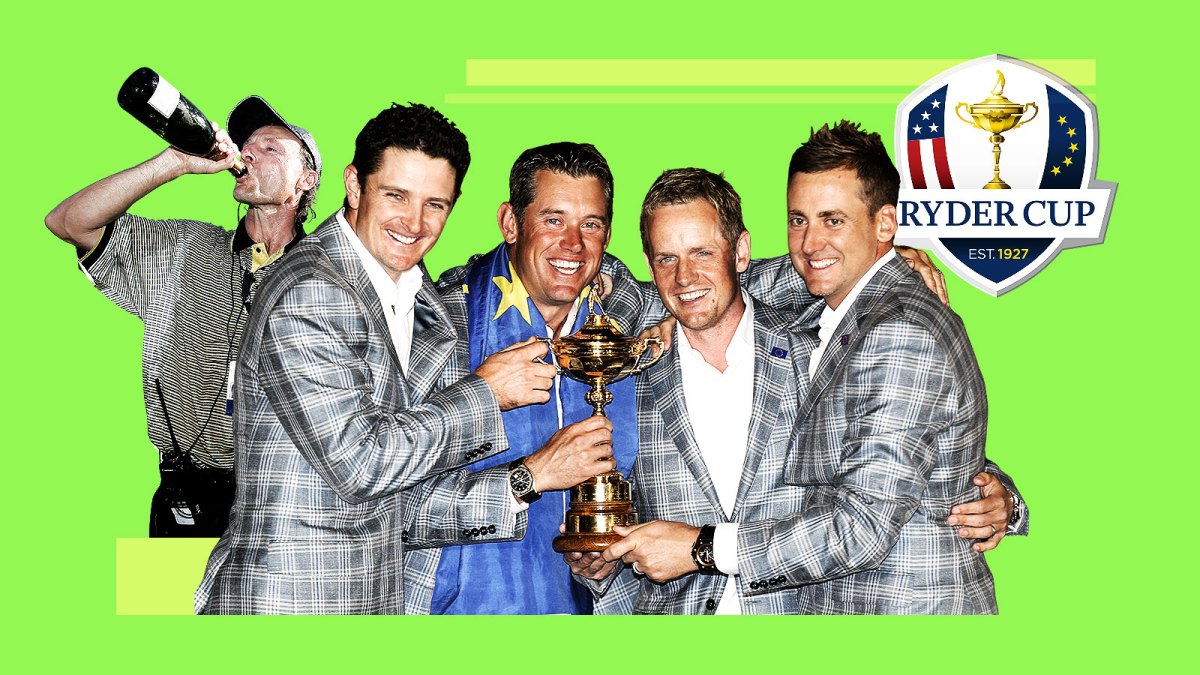Rory McIlroy calls winning an away Ryder Cup “the hardest feat in golf”, which is quite a statement given that his bruising Masters triumph in April made Hercules’s labours seem about as taxing as putting the bins out. Overseas triumphs in the biennial bunfight have become sporting rarities, with Europe managing it only twice since 1995, most recently via the Miracle of Medinah in 2012. The USA have fared even worse and have not won on the road since 1993.
As we head to New York for the latest staging, Rick Broadbent sought the thoughts of key figures in Ryder Cup highs and lows to ask why it has become such an insurmountable obstacle and whether this European team have a chance to buck the trend.
Tom Watson (USA)
(Away wins in bold). 3 wins as a player: 1977, 1981, 1983. 1 tie: 1989. 1 win as an away captain: 1993. 1 defeat: 2014
“It’s the 13th man,” says the eight-times major winner and last US captain to oversee an away win. “In normal golf you don’t hear a cheer for a bad shot, but you do at a Ryder Cup. You need to be prepped for that.
“When we won at the Belfry in 1993, Payne Stewart brought Bruce Springsteen’s Born in the USA with him. Now if you listen to the lyrics, it doesn’t have much to do with patriotism, but just waking up to that in the morning got us in the mood.”
The preamble to that last win on the road for the USA came with layers of intrigue. Paul Azinger was one player not keen on a meeting with President Clinton at the White House. The impasse was broken the night before when he turned up to a team dinner in a Clinton mask. The meeting went ahead, but there was more melodrama when Watson declined to sign European player Sam Torrance’s menu at the gala dinner, saying he would rather do it in private to avoid a deluge of similar requests.
Come the actual golf there was a Friday fog delay. “I thought Payne and Paul were going to be our star players, but I remember Payne’s eyes were wide open with anxiety by the time they teed off,” Watson says. They lost 7 and 5 to Ian Woosnam and Bernhard Langer.
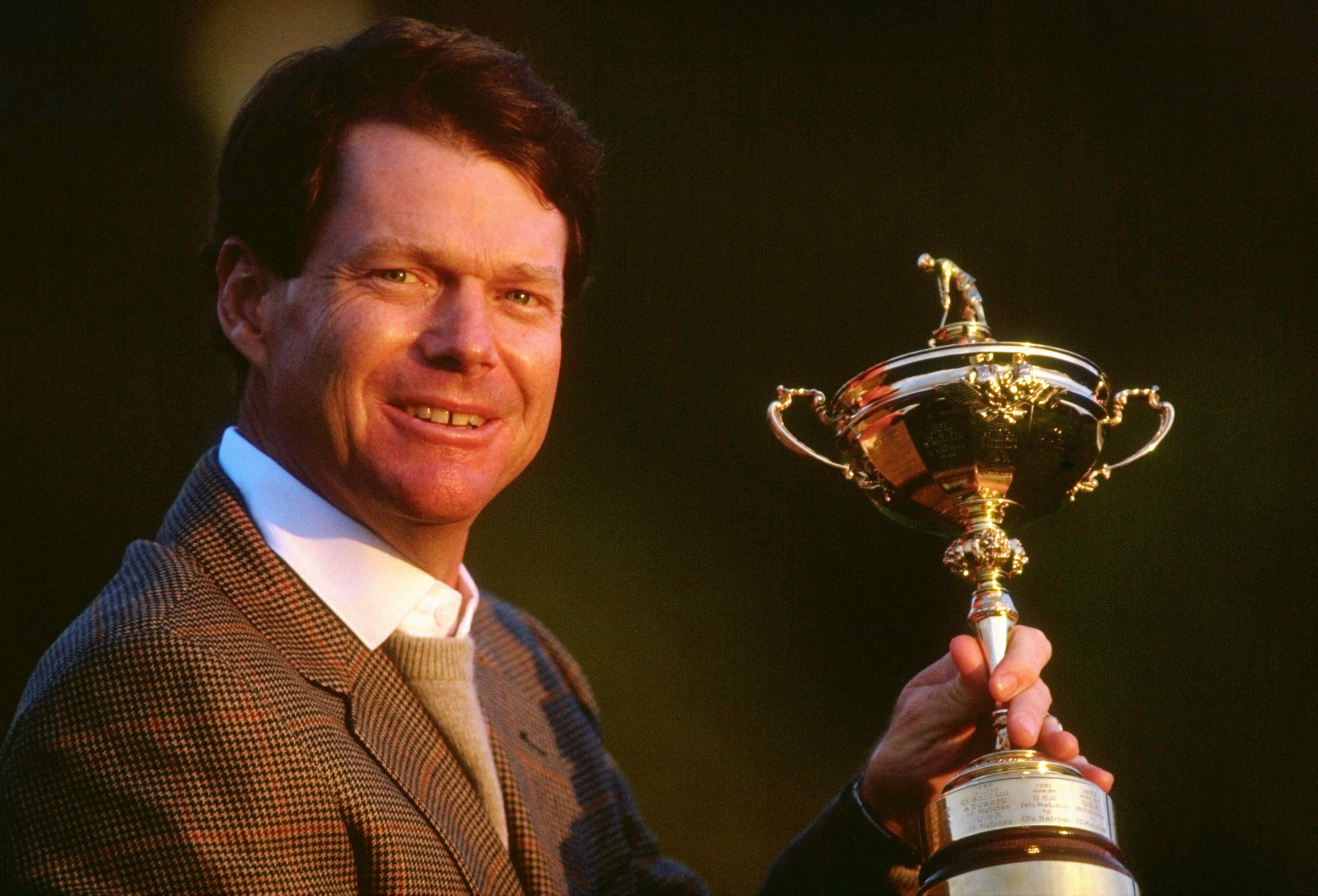
Watson at the Belfry in 1993. “It’s a misnomer that Americans don’t care as much,” he says
CHRIS COLE/ALLSPORT/GETTY IMAGES
Watson believes moments in matches birth almost unfathomable momentum shifts. “We were down by three going into the Saturday four-balls,” he recalls. “John Cook and Chip Beck were up against Nick Faldo, their star player, and Colin Montgomerie. When your team saw those red numbers go up against those two that gave us a massive shot in the arm.”
The USA still trailed by a point going into the singles. Torrance had to withdraw because of a septic toenail, meaning Watson had to bench one of his players. “Lanny Wadkins had come up to me before and said, ‘I want my name to be in the envelope.’ He said he had relied on a pick and could not take the place of someone who had played their way on to the team. That was a classy act. It’s a misnomer that Americans don’t care as much.”
The crushing defeat as an away captain at Gleneagles in 2014, when Watson was savaged in the post-match press conference by Phil Mickelson, has not dampened his enthusiasm. And, ultimately, he says skill under pressure is what counts, as was evident when he won as an away player at Walton Heath in 1981.
“In the team meeting Dave Marr says, ‘I’m pairing Tom and Jack [Nicklaus] together,’ and Jack goes, ‘That makes us two up on the first tee.’ It made everybody laugh, but I wasn’t playing well. I put Jack in the heather five times, but he extricated himself every time — the best rough player that ever played.” The USA won 18.5-9.5, still the joint-record winning margin for an away win since the advent of Europe in 1979.

The victorious American team in 1981 – no other American team have pulled off such a dominant away win
GETTY
Padraig Harrington (Europe)
4 wins as a player: 2002, 2004, 2006, 2010. 2 defeats: 1999, 2008. 1 defeat as an away captain: 2021
Harrington witnessed how a boisterous crowd can bubble over into unpalatable ugliness when captaining Europe to their biggest defeat, at Whistling Straits in 2021.
However, despite Shane Lowry’s wife receiving “dog’s abuse” and parents of other players being reduced to tears, he believes the 13th man could be a disadvantage this time. “What will be interesting at Bethpage is New York fans are notorious for turning on their own team,” he says. “If the US look like they’re underperforming, the New York crowds will get on their backs for not trying, for not believing.”
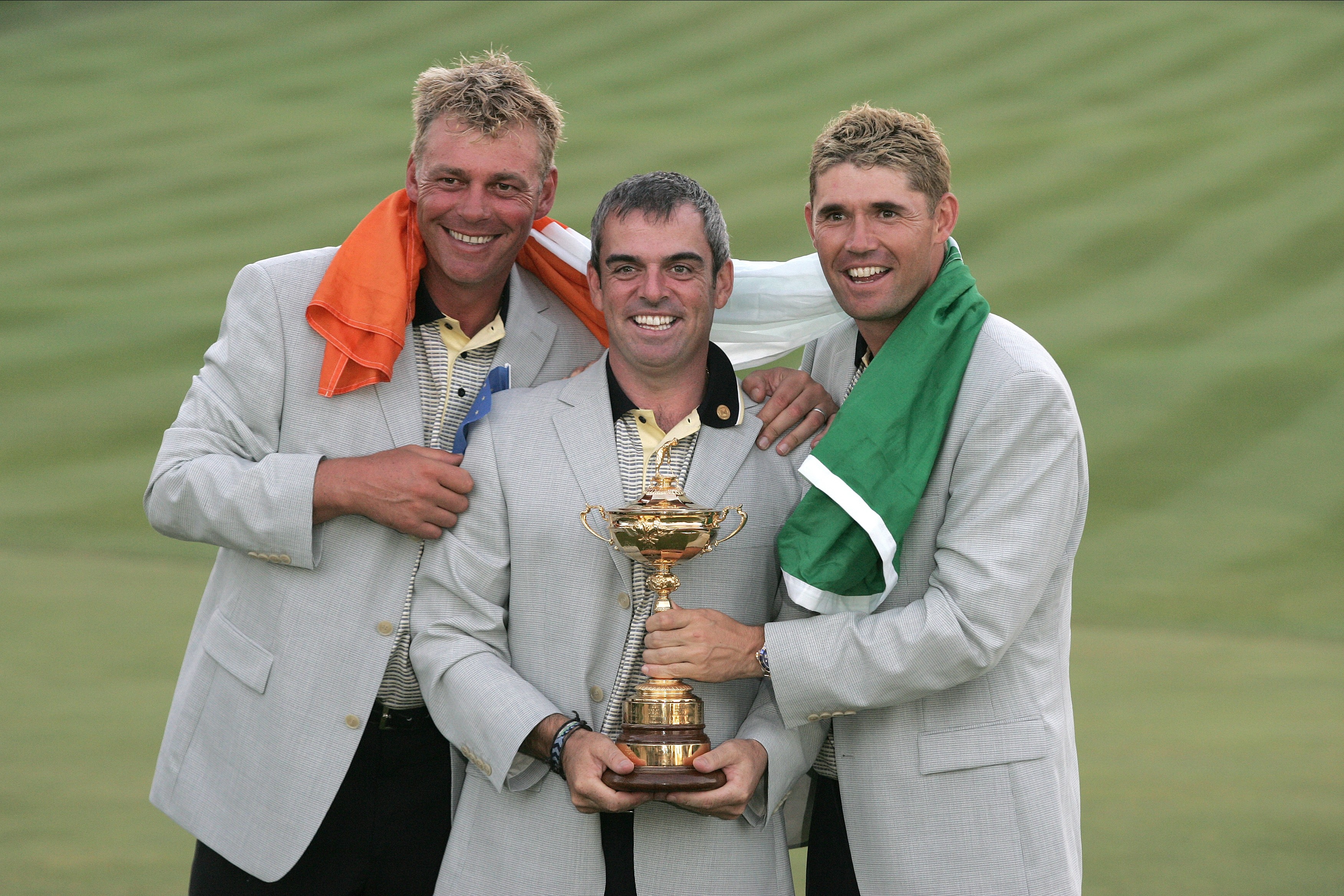
Harrington, right, at Oakland Hills in 2004. He believes the New York fans could turn on the American team this time if they are not performing
RICHARD SELLERS/SPORTSPHOTO/ALLSTAR VIA GETTY IMAGES
Harrington says Luke Donald must keep the distress of families and backroom members away from the players. “It can’t spread behind the scenes. They need to get it off their chest, but not tell everybody else and get them all riled up.”
A fast start is also essential and the Miracle of Medinah is the only time Europe have lost the opening session and gone on to win in the US. Yet Harrington feels there is a different balance between the teams this time.
“The US players are under pressure, there’s no doubt about it, and I don’t think they have as many genuine household names that are loved. They don’t have DJ [Dustin Johnson], they don’t have Brooks [Koepka], they don’t have [Jordan] Spieth. Even Patrick Reed. These are guys that can do miraculous things when they’re out of form. I don’t know if it’s a changing of the guard with the US team, but they don’t have the same intimidation factor.”
Last time in Rome, the enmity transferred from galleries to green to parking lot as McIlroy erupted over the protracted way Patrick Cantlay’s caddie, Joe LaCava, had celebrated a putt. Harrington suggests Cantlay was deliberately milking an opportunity. “There were three or four occasions where Cantlay could have told LaCava to stop, and he just let him go with it. It’s a bit of the Roy Keane thing; when things are going wrong you’ve got to bump into somebody. The US had nothing at that stage. They were just flat. OK, it backfired, but you’ve got to try change the flow at the Ryder Cup.
“But I think Europe’s players are bigger names, the bigger brands now. People will say that’s not part of golf, but who you feel you are is very much part of it. For once, I think we’re the bigger team.”
Bernhard Langer (Europe)
5 wins: 1985, 1987, 1995, 1997, 2002. 4 defeats: 1981, 1983, 1991, 1993. 1 tie: 1989. 1 win as an away captain: 2004
Langer had seen the best and worst of the Ryder Cup. The 1991 staging at Kiawah Island became infamous as the War on the Shore and comprised controversy about Seve Ballesteros’s cough, army fatigues and rumours of a ball tossed from the crowd to the fairway during Langer’s match with Hale Irwin, which ultimately helped to decide the outcome of the contest.
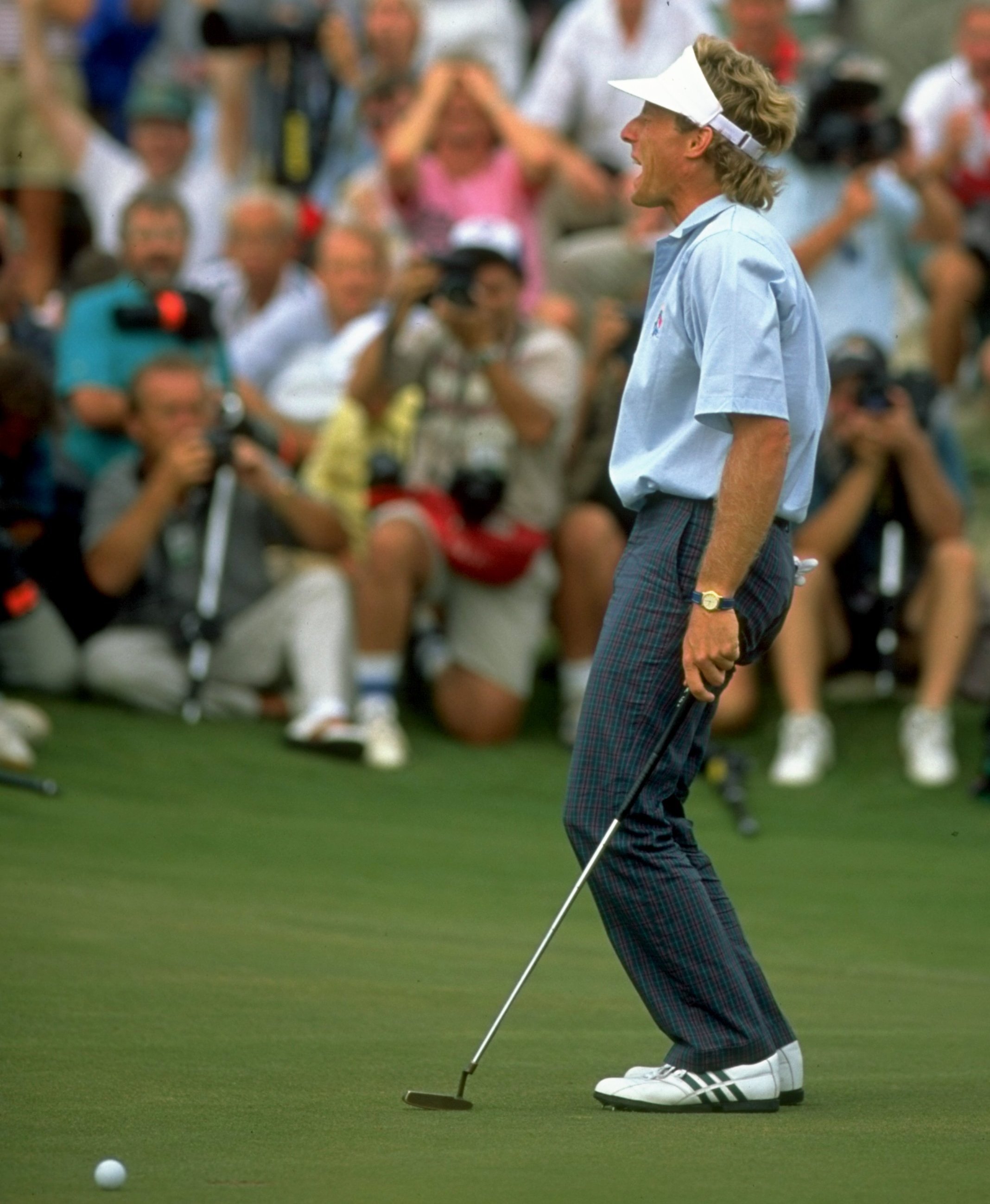
Langer misses a crucial putt on the 18th at the acrimonious 1991 edition
DAVID CANNON/ALLSPORT
“I actually tied my match, but people don’t remember that,” he says. “I missed a putt and had a couple of sleepless nights, but I’d become a Christian a few years before and golf wasn’t life and death any more.” Indeed, he was the one telling Ballesteros “don’t cry” in the aftermath. “It got out of hand that year. At times it wasn’t about friendship any more, but it wasn’t war.” Langer’s father had been a prisoner of war and jumped off a Russian train headed for a Siberian labour camp, but others lacked his hand-me-down perspective.
The winning captain in the US in 2004 knew what the Ryder Cup could do to people. “Very, very few get better under pressure,” he says. “Nicklaus had it and Tiger Woods had it, but I’ve heard stories where guys have talked strategy the night before and decided who will play the odds and evens, who it will suit to have more chips or drives, and when this particular player got to the first tee, he was so overwhelmed that he goes to his partner, ‘I can’t hit the shot.’ That’s what you’re dealing with.
“Part of the plan at Oaklands Hills in 2004 was to treat the fans nicely. At times they’d heckled Colin Montgomerie, who’d say something back and inflame it. If you ignore them and treat them nicely beforehand, signing autographs, it becomes less fun for them. Eventually they shut up.”
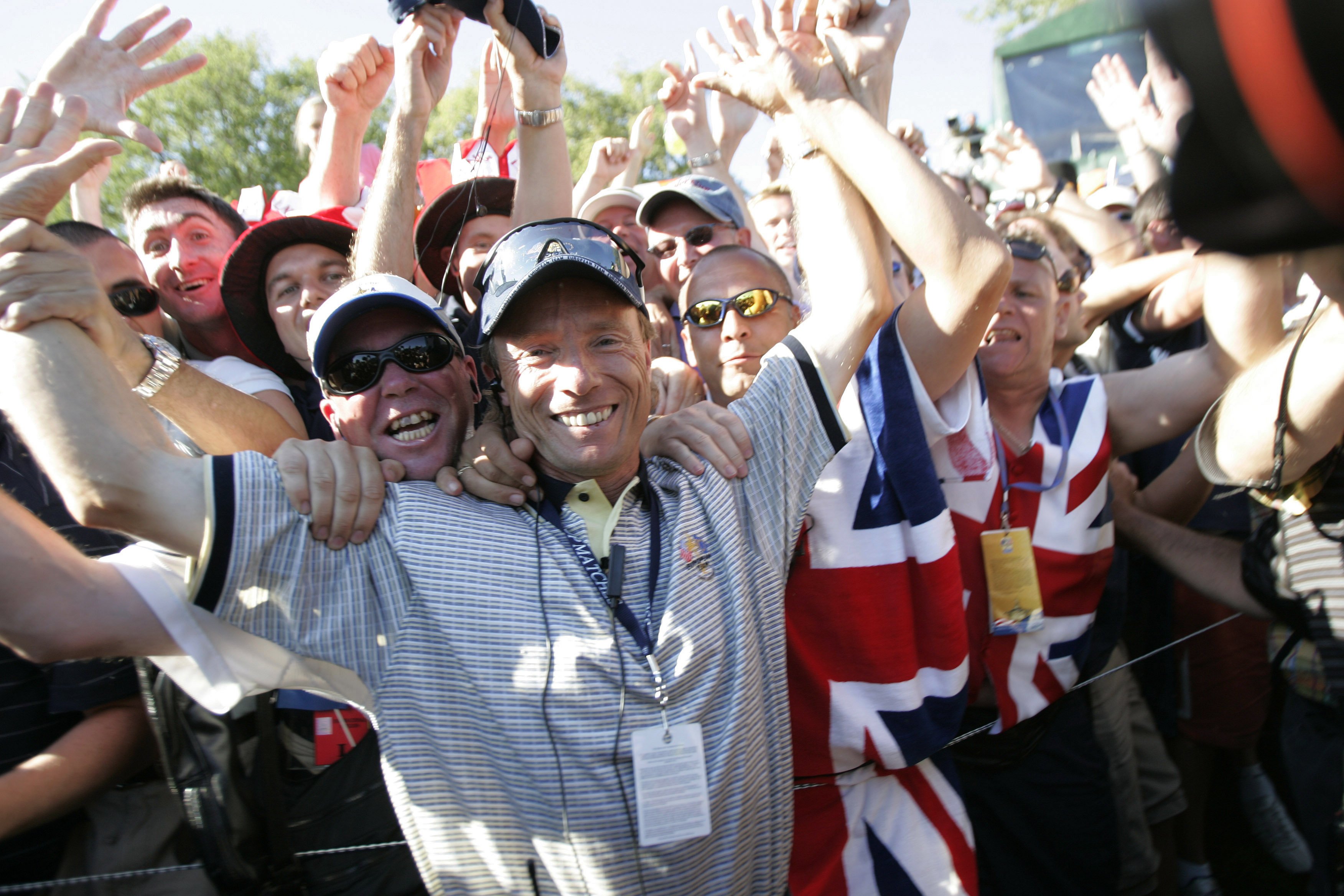
Langer consulted World Cup-winning Germany star Beckenbauer before Europe’s 2004 triumph
TIMES PHOTOGRAPHER MARC ASPLAND
Seeking outside help was another part of his plan and Langer, now an ambassador for Mercedes-Benz, had spoken to Franz Beckenbauer, the World Cup-winning football player and manager. “My goal was no prima donnas, and I picked his brain because he had to make a team from the best 12 Germans who were usually trying to beat each other. I didn’t think Seve or Faldo were better than the nine or ten.” His team won 18.5-9.5.
During his long Ryder Cup career, Langer says the significance of course set-up diminished. Traditionally, the USA team preferred light rough, while in the 1980s and 1990s, Europe would narrow the Belfry fairways to negate the driving advantage of the American big hitters. “And we’d slow the greens to ten or so because they’re used to 13 [on the Stimpmeter measuring device].” Like Donald, Langer believes that Europe’s players being PGA Tour regulars means the set-up factor now has reduced importance. “Nothing helps more than making putts.”
Justin Leonard (USA)
2 wins: 1999, 2008. 1 defeat: 1997
Leonard made one of the most memorable putts in Ryder Cup history on the 17th hole at Brookline in 1999. That 45-foot odyssey sparked over-zealous celebrations from the American team, despite José María Olazábal still having a chance to make the birdie that would have prolonged the contest. In his Letter from America, veteran journalist Alistair Cooke said: “Mr Leonard went berserk with joy,” lamented the “greed, liquor, jingoism and bad taste” and concluded he had seen “the arrival of the golf hooligan”.
Even if it was the TV cameramen who trampled across Olazábal’s line, it was proof of the passion, stakes and difficulty of playing in the US. “It was a putt we’d all hit in practice but not a putt you try to make,” Leonard says. “I was just trying to get the speed right and I didn’t because it was moving too fast. The only way it was going in at that pace was if it hit the centre. Fortunately, it did.”
What does he think now of the scenes that Torrance hysterically called evil? “Hopefully, if it happened again, it would be different,” he says. “It was just a culmination of all the excitement of the day. I don’t think it overshadows the moment now, but I think it dampened it then. In the US it was overlooked but on the European side it wasn’t and that’s understandable.”
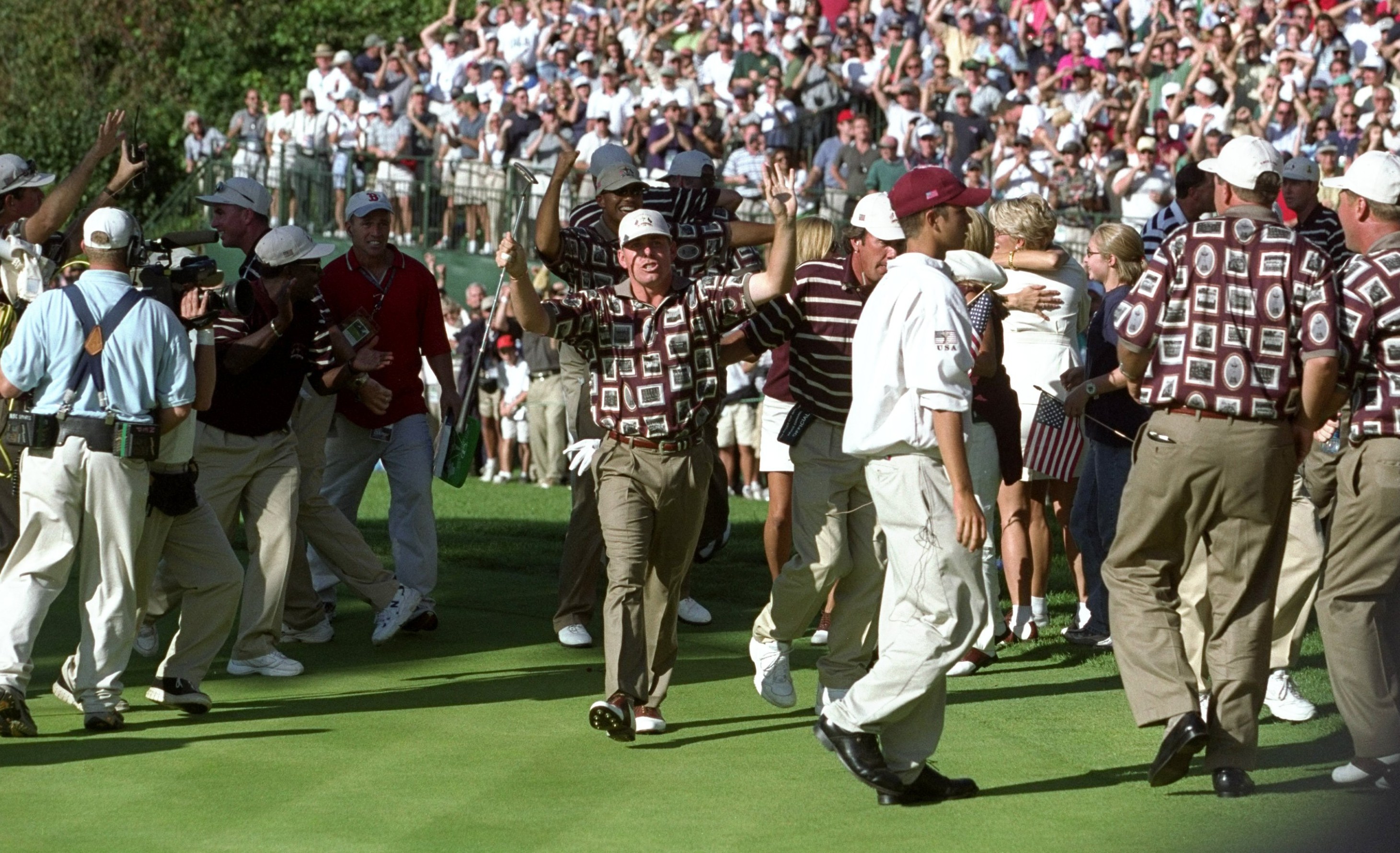
Leonard tries to clear the celebrating American team off the green after sinking a 45-foot birdie putt at Brookline in 1999
ANDREW REDINGTON/ALLSPORT/GETTY IMAGES
Torrance bore his grudge, but what was it like when Leonard next faced Europe’s players? “I got paired with Olly [Olazábal] later in the year at Valderrama and thought, ‘Oh boy, this is going to be interesting, it’s a good thing I don’t speak Spanish.’ But there were a couple of moments where Olly stood up for me and shushed the crowd, just a perfect gentleman. I think he understood the emotions, the moment, everything, better than anyone else.”
Olazábal would get his belated revenge as the last European captain to win away in 2012, although that event’s nickname shows just how unlikely a triumph it was. Donald will hope for a better-plotted success.
As for New York, Leonard says: “It’s not like you’re going to have 25,000 New Yorkers from the Bronx at a Giants game. It’s such a big corporate event now, but even if you’re not from New York you’re going to become one for a week and there’s a chance it could veer over the line. Hopefully, it’s respectful.”
Leonard won the Open in 1997, but the Brookline putt really made his name. Indeed, Ben Crenshaw, the winning captain in 1999, still calls him Francis after Francis Ouimet, who made a similar putt on the same green when winning the 1913 US Open. “Mind you, he calls his cat Francis too,” Leonard says.
Tony Jacklin (Great Britain & Ireland/Europe)
6 defeats: 1967, 1971, 1973, 1975, 1977, 1979. 1 tie: 1969. 2 wins as captain: 1985, 1987. 1 tie: 1989
To know about winning away you really need to talk to Jacklin, the captain who stopped the rot. Europe and Great Britain had not won a Ryder Cup since 1957 when Jacklin’s team triumphed at the Belfry in 1985. Two years later they finally won away at Muirfield Village in Ohio.
Much has been made of Jacklin working on his side’s self-esteem, from Savile Row fittings to Concorde flights, but a more important move was getting Ballesteros to play after his exile over a row about appearance money on the European Tour. “And in 1987 it helped we were playing at Muirfield where they were traditional Memorial Tournament galleries. I can still see it today, still feel it. I remember Jack [Nicklaus] getting 1,000 American flags and distributing them to gee up the crowd. We already had the momentum because of the way the galleries were.”

Jacklin, left, and Ballesteros after Europe’s first win on American soil in 1987
BRIAN MORGAN/POPPERFOTO VIA GETTY IMAGES
Sometimes things happen beyond best-laid plans. During that landmark win in the US, by just two points, it helped that Crenshaw had broken his putter in anger on the 6th green. “He was putting with a sand wedge and Eamonn Darcy had the fastest putt in the history of man to win,” says Jacklin. Darcy, ranked 100 places below Crenshaw and with a hitherto terrible Ryder Cup record, came through.
Jacklin is 81 now. His struggles with deafness but his cancer has been in remission for five years and he remains sharp, with trenchant views. Payments for this year’s USA players? “It’s sheer human greed.” Keegan Bradley’s decision to not be a playing captain? “He’d have been nuts if he’d played. I don’t get what the suspense was all about because it’s not like he’s that good that he can guarantee a win every time he plays.”
He is also very optimistic that Europe may be about to win away for the first time since Medinah and cites Bob MacIntyre as an inspiration. “I’m not sure I thought he was as good as he is, but he’s the best putter Scotland’s ever had and that includes Montgomerie. He’s comfortable in this environment and he fears nobody. He could play Scottie Scheffler and it wouldn’t faze him one bit. That’s the sort of player you want.”
It is a Ryder Cup truth that history really is written by the winners, with the outcome often ignoring the nuances, mistakes and fate’s feckless U-turns. If Donald pulls off “the hardest feat in golf”, it will be a triumph to stand the taunts of time or anyone else. “Basically, you’re a genius if you win,” says Jacklin, “and a plonker if you don’t.”

